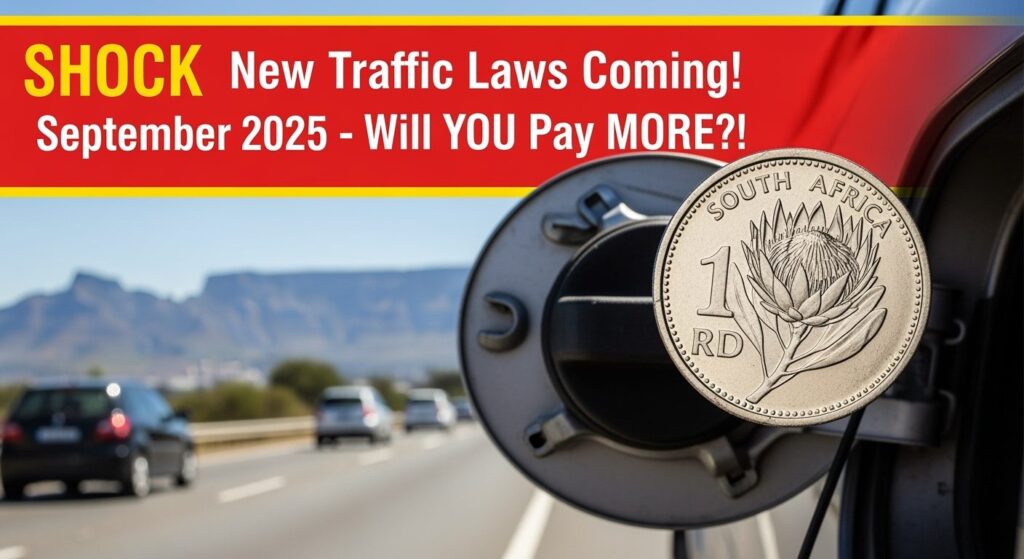South Africa traffic rule changes: I’ve been keeping a close eye on the upcoming modifications to South Africa’s road regulations, and I have to warn you – your wallet might feel a bit lighter come September 2025. The Department of Transport has announced a comprehensive overhaul of traffic fines and regulations that will significantly impact all drivers across the nation. Have you been keeping up with these impending changes? The new framework aims to improve road safety but comes with substantially increased penalties for violations, making it more important than ever to understand and comply with the updated rules.

What Changes Are Coming in September 2025
The most notable aspect of these South Africa traffic rule changes is the substantial increase in fines for common violations. Speeding tickets will see a 35% increase across all categories, with penalties for exceeding the limit by more than 30km/h nearly doubling. Additionally, the points-based demerit system will become more stringent, with higher point deductions for serious offenses. Cell phone usage while driving will now carry one of the heaviest penalties, reflecting the government’s focus on reducing distraction-related accidents. Parking violations haven’t escaped the revision either, with fines increasing by approximately 25% in urban areas.
Another significant change involves the introduction of mandatory vehicle safety inspections for all vehicles older than eight years. These inspections will need to be conducted annually at accredited centers, with failure resulting in substantial penalties and possible vehicle impoundment. The cost of these inspections will be borne by vehicle owners, adding another expense to the already rising cost of vehicle ownership.
Why These Changes Are Being Implemented
The primary motivation behind these South Africa traffic rule changes stems from alarming road safety statistics. According to the Transport Department, South Africa continues to have one of the highest road fatality rates globally, with over 14,000 deaths annually. The government believes that stricter enforcement and heavier penalties will serve as effective deterrents against dangerous driving behaviors. There’s also a financial aspect to consider – the increased revenue from higher fines will reportedly be channeled into road infrastructure improvements and enhanced traffic monitoring systems.
Environmental concerns have also played a role in shaping these new regulations. Vehicles failing emission tests during the new mandatory inspections will face additional penalties, reflecting a growing emphasis on reducing the environmental impact of transportation. The government has stated that these measures align with international best practices and represent a necessary step toward creating safer, more sustainable road networks across the country.
How to Prepare for the New Regulations
I strongly recommend familiarizing yourself with the complete list of updated regulations well before they take effect. The official Department of Transport website will publish comprehensive guidelines by March 2025, giving you adequate time to understand the changes. Consider scheduling a voluntary vehicle inspection before the mandatory requirements kick in – this will help identify any potential issues that might need addressing. Many automotive service centers are expected to offer pre-inspection services at reduced rates to help drivers prepare.
- Review your vehicle’s maintenance schedule and ensure all systems are in good working order
- Download the updated traffic fine schedule when available to understand potential penalties
- Consider defensive driving courses to refresh your knowledge of road rules
- Check if your vehicle insurance covers the new mandatory inspections
It’s also worth noting that several mobile apps are being developed to help drivers navigate these changes. These apps will provide reminders about vehicle inspection dates, updates on changing regulations, and even real-time alerts about high-enforcement zones. Staying informed will be your best defense against unexpected fines.
When Enforcement Will Begin
While the South Africa traffic rule changes officially take effect in September 2025, the Department of Transport has announced a phased implementation approach. The first month will serve as an adaptation period, during which officers will issue warnings rather than fines for certain minor infractions. However, serious violations like drunk driving and excessive speeding will face immediate full penalties. By November 2025, all aspects of the new regulations will be strictly enforced nationwide, with no grace periods or exceptions.
The electronic enforcement infrastructure, including additional speed cameras and monitoring systems, is already being installed across major highways and urban centers. This technology-driven approach aims to ensure consistent enforcement regardless of physical police presence. The department has also mentioned plans for mobile enforcement units that will rotate through different areas, making it difficult for drivers to predict enforcement patterns.
Real Impact on Everyday Drivers
Consider the case of Johannes Nkosi, a delivery driver from Johannesburg who participated in the department’s public information session. Under the current system, his occasional speeding violation (15km/h over the limit) costs him R750. With the new regulations, the same offense would result in a R1,012 fine plus two demerit points. For someone earning approximately R12,000 monthly, this represents a significant financial burden. The department acknowledges these concerns but maintains that the deterrent effect will ultimately benefit all road users through improved safety.




